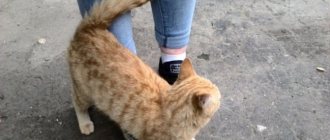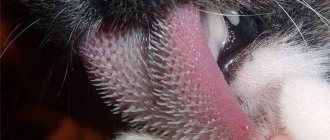“Man is a dog’s friend,” the words of a children’s song from a good Soviet cartoon come to mind. “The dog is the first wild animal tamed by the caveman,” another cartoon from childhood enlightens. And somehow it was customary to consider a dog a faithful and devoted creature. It turns out that not everyone shares this opinion. There is also the opposite, according to which “man’s friend” is a dirty animal, with base instincts and even the embodiment of the devil himself. This view is firmly rooted in Islam. For what “merits” did these four-legged animals fall out of favor? It needs to be looked into in detail.
A little history
Despite the widespread belief that the dog was the first domesticated animal, scientists still argue that the wolf was such an animal. It was he who was the assistant in hunting and the guard of the ancient man’s home. What about the opinion that the wolf cannot be trained? To tame does not mean to make it domestic.
In Islam, a dog is considered unclean
Apparently, the saying “no matter how much you feed a wolf, he still looks into the forest” was relevant 8 thousand years ago. Unable to domesticate this predator, ancient man repeated his attempt with a dog.
For reference! According to one theory, the dog is a descendant of a domesticated wolf or jackal; according to another, a wild dog actually existed in nature.
How did the dog become a pet? According to scientists, a wild animal (wolf, jackal) came to a human dwelling, smelling the smell of food. Having received food once, the animal began to visit more and more often. Feeding on the same food as humans, over time the animal became an assistant in hunting, and later a home guard. For an animal to become a domestic animal, it had to be born in captivity and not remember another life. This required a change of more than one generation of tamed predators.
Forgotten history
However, in Islam there is a completely different, not entirely known tradition regarding dogs - a long history of positive relationships between Muslims and them, going back to the very origins of this religion.
According to several authoritative accounts of the life and teachings of the Prophet Muhammad, he himself prayed in the presence of dogs. Many of his cousins (the world's first Muslims) raised small puppies. The Prophet's Mosque in Medina, which is the second holiest site in the world for Muslims after the Kaaba, was regularly seen frolicking with dogs during Muhammad's lifetime and for many centuries after.
Islam's attitude towards dogs
A dog in the house according to Orthodoxy: why you can’t keep it
These predators were close to man before the formation of the dogmas of world religions. However, with the advent of the first prophets, the four-legged assistant did not go unnoticed. Attitudes towards him have changed at different times. Increasingly, opinions were voiced about the baseness of dog instincts and the depravity of these creatures.
Muslims have a legend that once a dog bit the prophet, for which he was cursed. No confirmation of this was found in the Koran, which, however, does not prevent Muslims from considering these animals najas - translated as “unclean”, “dirty”.
For a person professing Islam, touching najas means desecrating oneself. After accidental contact, he must perform ablution. If a pet drinks from a person’s glassware, it must be washed at least seven times.
After touching a dog, a person must perform ablution.
What the Prophet said about dogs.
According to Islam, dogs cannot be bought or sold, but it is permissible to give them as a gift to someone. Sharia allows keeping a dog only for protection (outside the house), for the purpose of grazing livestock and protecting. You can also euthanize the dog if it is not possible to resolve the issue in a permitted way.
The Hadith of the Prophet prohibits keeping a dog for entertainment purposes. It was narrated from Ibn Umar: “I heard the Messenger of Allah say: “The reward for serving Allah who keeps a dog, except for hunting or grazing cattle, is reduced by two large shares every day.” (Reported by Malik and Muslim).
Perhaps a negative attitude towards dogs is one way to annoy Zoroastrians, adherents of a religion that was widespread in the East before the advent of Islam. The Avesta, a collection of sacred texts of the Zoroastrians, says many kind words about dogs and gives instructions on how to treat them, and also describes severe punishments for inappropriate treatment of dogs. Read more about the attitude of Zoroastrians towards dogs and quotes about dogs in the Avesta.
In original Islam there is no trace of hostility towards the dog as an unclean animal (this opinion is now widespread among Muslims). Muslims associate 10 animals with the sky and, accordingly, their owners: ram (Ibrahim), donkey (Balam), lapwing (Bilqis), whale (Iunus), alBuraq horse (Muhammad), ox (Musa), dove (Nuh), camel (Salih ), the dog Kitmir (People of the Cave - Ashab al-Kahf), the ant (Sulaiman). Ashab al-Kahf ("those in the cave"), in Muslim mythology, young men who hid with a dog in a cave to protect their faith in one god during persecution. Episodes dedicated to Askhab al-Kafk are set out in the Koran, in Surah “The Cave”.
Surah "The Cave" is a chapter of the Koran about dogs.
According to the Koran, the young people turned to Allah with a request to have mercy on them and guide them on the right path. Allah heard the request and put them to sleep for 309 years, which seemed to them like “a day or part of a day.” Above their cave (in the ar-Rakim tract), with the entrance facing north, people later built a sanctuary (18:9-25). The Koran does not name the exact number of “those who are in the cave” and states that this number, as well as the duration of sleep, only “Allah knows best.” The Koranic story is a version of the Christian tale of the “seven sleeping youths of Ephesus,” which was widespread in the Middle East before the establishment of Islam. Kitmir , acquired a magical function ; in some Muslim countries, the name Kitmir was inscribed on messages to protect them from loss. In Iran, this attitude towards the dog was apparently encouraged due to the extraordinary respect that Zoroastrians showed for this animal.
Probably, a bad attitude towards a dog (like taking off a bush belt or spitting in the fire) was an outward sign of conversion to a new faith. The many torments inflicted on these animals by Muslims over the centuries serve as a sad example of the cruelty that results from religious rivalry. There are very few dogs in the Muslim world; they mostly lead a wandering lifestyle - pariah dogs, descendants of degenerate ancient breeds.
The use of dogs for hunting and as a guard is allowed.
The origin of the words “breed”, “dog”, “male”, “a dog’s life”, “bitch”.
Breed.
This word came to Europe from the Arabs in the 17th century. The word “breed” was used by the Arabs to designate the breeds of horses they bred. Strictly speaking, when they talk about a breed, they mean groups of animals of the same species, the different characteristics and appearance of which are inherited.
Curses like “dog”, “dog’s life”, “bitch”, etc.
Similar “expressions” supposedly also appeared in the East, from where they were later brought to Europe. Such a contemptuous attitude was primarily towards dogs that fed on carrion and garbage. It should be noted that despite this, there was a condescending attitude towards pariah dogs in gratitude for the cleaning of the streets they carried out. For example, many Turkish houses had bowls or troughs built in, which were filled daily with water for street dogs to drink. There was also a custom of establishing shelters for sick dogs and for whelping bitches.
"Dog"
In the Middle Ages, the attitude of the Mohammedans of Asia and African countries towards dogs was different: some breeds were expelled, while at the same time they worshiped other breeds. Street and yard animals are still not acceptable in a Muslim home, and the latest curse word against a European is “dog.”
However, in modern Muslim cities the practice of keeping dogs at home is increasingly developing. Despite the fact that for Muslims dogs are considered “unclean” animals, in recent years in Iran, especially among pro-Western wealthy citizens, the number of dog breeders has been growing. Many are trying to explain the incorrect interpretation of sacred texts, in which, in their opinion, there is no indication of the “uncleanness” of dogs.
Veterinarian surgeon Dr. Ayob Banderker, BVMCh, says that as the holy month of Ramadan (and other holidays) approaches, many Muslims are bringing their pet dogs to veterinary clinics to have them euthanased, that is, in other words, putting their own pets to sleep. They justify their actions with the following statement: “The month of Ramadan is coming soon, and my religion forbids me to keep dogs.”
On the other hand, there are very frequent cases of a sick animal being brought to death by complete inattention to it and ignoring all veterinary care. When he asks owners why they waited so long to see a veterinarian, Muslims usually explain their apathy by citing religious prohibitions against touching a dog. There was a case at the doctor’s clinic when the legs of a sick dog were wrapped in plastic bags and thus, without touching the animal directly, they were brought to the hospital.
There are many cases of cruelty and/or indifference towards dogs by Muslims, who in these cases hide behind only their faith. The number of dogs euthanized during the holidays is constantly increasing. Veterinarians are increasingly encountering Muslims bringing in healthy, happy animals to be euthanized. The real tragedy is the open and unconcealed belief of Muslims that they are committing this horror in the name of their faith. “The dog, like all creatures living on Earth, were created by Allah. All Muslims must protect our beautiful planet. Dogs, like all other living creatures that we claim to own, truly belong only to Allah. All animals are, according to Islam, Muslims, subject to the will of Allah, only man and the genie have freedom of choice.
“So even animals are Muslims,” says Dr. Ayob Banderker. The Koran (C4:36) says that a person must do good “...to everyone who is in his hands.”
Commentator Imaam Fargudin al-Rashi says that this statement applies not only to the holders of civilizational rights, that is, to animals. Accordingly, it is man's duty to treat all living beings well, including dogs. All animals are part of Allah's creation, and each of them is endowed with its own purpose. And every person should respect everything created by Allah, since it is not meaningless.
If a person is cruel to any creation of Allah, he will have to answer for it during the Day of Judgment.
Here are some of the Muslim myths regarding dogs: You cannot keep a dog, and it is also unhygienic, so dogs should not be allowed into the house. Don't touch dogs. If a dog licks a person or his clothes, then it is necessary to wash or change clothes.
Every Muslim who keeps animals, either as a pet or as a farm animal, must provide them with decent food, shelter, drink, and when necessary, veterinary care. However, this process is happening rather slowly, since Islam is a conservative religion.
Attitudes towards dogs in Iran.
So in Iran, religious leaders insist on catching all dogs in the country. The newspaper Etemad quoted Mullah Gholamreza Hassani as saying during Friday prayers in the northwestern city of Urumiyeh: “I call for a law to be introduced requiring the capture of all dogs with long legs, short legs, dogs with medium-sized paws and arrest their long-legged owners. Otherwise I will do it myself,” he added. “We have freedom of speech in our country,” said Hassani, known for his frequent eccentricities. “Some people perceive this freedom as an opportunity to promote un-Islamic and depraved behavior.”
Iranian police have already carried out several isolated confiscations of dogs whose owners were with their pets on the streets and in public parks. Hassani, in his latest statement, called for an expansion of the anti-dog campaign that began last year, when Urumiye police caught all the dogs found in the city.
when using material
a link to the resource wolcha.ru is required
What the Koran says
In the Muslim holy book there are only three references to dogs, which cannot be interpreted unequivocally negatively.
Why dogs can’t have chocolate: what to do if they eat it
The first can be read in Surah Al-Araf. It features a non-believer in Allah and the Prophet; he is compared to a dog who is doomed to satisfy only his earthly, base needs and who has no entry into heaven.
Surah Al-Maida says that a believer can eat game brought by domesticated predators. Moreover, taming wild animals like dogs is a matter pleasing to Allah.
Surah “Ashab al-Kahf” tells about young Muslims who were forced to flee religious persecution by leaving their hometown. To shelter them from their pursuers, the Almighty sends a three-century long dream over them, and leaves a dog to guard them.
Attention! There are no other mentions in the Koran, but this was enough for a negative interpretation and classifying the “friend of man” as a dirty animal.
Can Muslims keep dogs in the house?
Why you can’t “humanize” a dog’s behavior
The main book of Muslims contains all the information about the universe and the laws by which a person should live. However, not everyone is given the ability to comprehend the Word of Allah.
Islam's attitude towards dogs is one of the most controversial issues. Can Muslims keep a dog at home? There is no open ban on keeping a four-legged pet in the Koran. But a person professing Islam is allowed to allow only clean animals into his home. But a dog, as you know, is not one of those. Dog hair and saliva are believed to be dirty and should not be touched by a believer.
On the other hand, the Koran says that if a dog lives nearby, then the person must carefully monitor the order in the house. Wash dishes from which your pet has drunk seven times, and wash clothes that your pet has touched seven times. If this is not enough, the area of contact should be cleaned with earth mixed with water.
From this we can conclude that the Koran does not prohibit keeping these animals in the house, but calls for maintaining cleanliness.
Angels don't enter a house with a dog.
The conviction that angels do not cross the threshold of a house where this animal exists has become another reason why Muslims do not like dogs.
There is a legend according to which Jibraeel did not appear to the Messenger of Allah DbeAip at the appointed time. DbeAip could not believe that the archangel broke his promise. Then he turned his attention to his bed, under which the puppy was sitting. The owner lamented that he did not notice how he got into the house.
Only after the dog was taken out did the Archangel appear with the words: “Truly, we do not enter any house in which there is a dog or an image.”
Hadiths
If you read the hadiths without relying on the explanations and interpretations existing in Islam, then some of them can really inspire the idea that the issue of aversion to dogs in Islam is rooted in their texts. But if you take the trouble and delve into the content of scientific disputes regarding their content and interpretation that arise in Islam, you can see that a deeper understanding of the content of the texts can lead to completely unexpected legal conclusions from them.
Is it necessary to kill dogs according to Islam?
There are a number of hadiths that have several semantic variations. Narrated by Tirmidhi, it contains the following words: “If dogs were not a community among communities, I would have commanded that they be destroyed, but kill every black one among them,” and then narrated by Muslim, it is said that Abu Dharr asked a question to the Prophet Muhammad ﷺ regarding What is the difference between a red dog and a black one, to which the Messenger of Allah ﷺ answered him that “A black dog is a shaitan.” Further, in another hadith transmitted by Bukhari, there are five pests that are allowed to be killed if a person is in ihram: “a snake, a scorpion, a kite, a rat and a vicious (biting) dog.”
But there is also a hadith transmitted by Nasai, in which the Messenger of Allah ﷺ forbids killing any living creature unless there is a reason for it, saying that a Muslim who kills even the smallest sparrow, not to mention someone larger, will definitely have to to report for this matter to the Almighty on the Day of Judgment.
Malikis believe that the latest hadiths cancel the previous ones, that is, killing dogs is prohibited if they are not dangerous . Islamic scholars discussed this topic quite a lot and came to the conclusion that during the period of time when the Prophet Muhammad ﷺ lived, dogs posed a significant threat to people, and therefore such recommendations took place, but over time this problem ceased to be relevant. As for the recommendation to kill blacks specifically, Islamic scholars were unable to interpret this wisdom of Allah Almighty.
Is it necessary to take ablution when touching a dog?
If we turn to those hadiths where we are talking about the purity of dogs, then no scholar in any madhhab of Islam has ever stated that after a Muslim touches this animal, he needs to perform ablution or wudu. This is also due to the fact that ablution and removal of najasa, that is, impurity, are different procedures.
Dishes for a dog to drink from
The words of the Prophet Muhammad ﷺ are quoted: “If a dog drinks from the vessel of one of you, let him wash the vessel seven times,” and this hadith has several interpretations, and one of the variants says that the vessel should be cleaned with earth. The Hanbalis and Shafi'is rely on this text in Islam as proof that a dog's saliva is unclean, just like its body. This statement is disputed by the Hanafis, as well as some Hanbalites, including Ibn Taymiyyah, who believe that this hadith can serve as proof that the saliva of a dog is unclean, but he does not say that its body is also unclean.
The hadith transmitted by Bukhari cites the memoirs of Ibn Umar, who said that when the Prophet Muhammad ﷺ was alive, dogs could enter and exit the mosque, urinate next to it, and people did not water these places with water.
The Zahirites and Malikis in Islam do not conclude from the first example that any part of a dog’s body is unclean, including its mouth. Their comments are that dogs cannot be considered unclean unless there is such proof.
Türkiye late 19th century. Stray dogs of Istanbul.
Malikis believe that during the time of the Tabiyeen living in Medina, that is, the first generation of Muslims in the world who lived in Medina after the death of the Prophet Muhammad ﷺ, dogs were not considered unclean. Their opinion is that the idea of the uncleanness of these animals in the Muslim world comes from the hadiths given above, and also such an opinion could arise from Surah Al Maida, in which there is a verse that talks about how hunting dogs were used, and that they brought their prey into their mouths. This rule was adopted in Medina, where the imam was Imam Malik, who at one time studied with the disciples of the companions of the Prophet Muhammad ﷺ.
Ibn Rushd has a distinct opinion, and his words clarify all the questions that may arise in connection with these texts.
He believes that the words of Al-Qadi in the Muqaddimah should not be understood as a hadith about najas or impurity. It should be understood as a warning to the drinker who may become infected by the dog, which may be rabid. Related to this is the existing prescription to clean dishes seven times and once with earth, and it is known that the number seven is also used in the treatment of various diseases. According to Ibn Rushd, he considers this explanation in Islam to be Maliki, and not simply a statement that a dog's saliva is unclean. He believes that Muslims simply obediently clean the dishes seven times, and they do not realize the wisdom of this injunction. When considering this hadith, one must also take into account the fact that during the period of history in question, outbreaks of rabies were probably not uncommon, and history knows many examples of this, and dogs were the carriers of this disease. And since preserving the life of a person on a scale of values outweighs the value of preserving the life of a dog, a Muslim should know that he should be careful about anything that may carry some kind of threat of infection. This is why you should wash items after your dog if you know there may be dog saliva on them. That is, it makes no sense to say that a dog is unclean and a Muslim should kill it as soon as he sees it, or that he cannot touch the dog or caress it or play with it.
A dog as a reason for entering Paradise
Places for feeding stray animals in Istanbul
In a hadith narrated by Bukhari, there is a case of a man who, while walking on his way, was thirsty and drank water from a well, which he found on the way, going down to the water. When he got out, he saw a dog, sticking out its tongue from thirst, eating wet soil. When the man saw this, he realized that the animal was suffering from thirst, and then he again went down to the water in the well, filled his shoe with water, took the shoe in his teeth and began to climb up, still holding it in his teeth. When he went upstairs, he gave water to the dog. For this, Allah Almighty forgiven him all his sins. And when the Prophet Muhammad ﷺ was asked whether a Muslim believer was entitled to a reward for animals, the Messenger of Allah ﷺ replied that a reward was due for all living things.
For what purpose are dogs allowed?
Can Muslims have a dog? According to Sharia, a dog can only be used for hunting, herding flocks and protecting one’s home. Keeping this animal for fun is considered unworthy of a Muslim. Anyone who transgresses the commandments of the Prophet loses part of His mercy every day.
“Don’t get a dog unless it’s necessary,” say the preachers of Islam. And if there is a need for an assistant, then a Muslim must train and teach the animal. This is considered a godly deed. Then the believer is allowed to eat the game brought by the dog.
Attention! In addition to training, a person must take care of his animal.
Exception for greyhounds
There is an exception breed in the dog family, which is not only tolerated by Muslims, but also loved - greyhounds. They are groomed and cherished in every possible way, sewn clothes and fed with delicacies.
The love for greyhounds has its origins in the countries of the East, where there is a legend about how the first representative appeared. It says that King Solomon, for the dog’s willingness to serve him, decided to reward the animal with beauty and stroked its muzzle until it became sharp.
Touched by the dog’s obedience, the Prophet said that he and the horse would accompany a person to paradise and appear second before Allah.
The Prophet bequeathed not to have dogs unless necessary, with the exception of greyhounds
The original role of dogs among Muslims
Many people are interested in the religion of Islam: is it possible to keep dogs at home? First, we need to tell you what the general role of dogs was in the ancient world.
Many Muslims kept large herds of sheep or goats, so they needed animals that could protect their flocks from predators. These animals were four-legged animals. They not only scared away wolves and other predators, but also prevented the herd from scattering.
Islam prohibits having a dog at home
A little about touching a dog
Is it permissible to touch a dog in Islam? It is believed that a Muslim should not touch a dog.
Why? What argument do believers give? The most common one is that this animal is najasa (unclean, dirty, hindering prayer). Islam has a list of impurities, after contact with which a believer cannot enter a mosque or begin prayer without purifying himself.
Substances that pollute Muslims include:
- human and animal excrement;
- pork fat, leather, wool, hooves;
- blood;
- vomit;
- male seed;
- dog saliva.
How did the dog get on this list? An explanation for why Muslims should not touch dogs may be the fear generated by the fact that this animal has many diseases similar to humans. In order not to be afraid of infection, Muslims have limited contact with dangerous pets.
Is it possible to touch a dog?
If a Muslim fundamentally adheres to the literal interpretation of hadiths, then despite this, most theologians are of the opinion about the purity of a dog's skin .
Although some scholars in Islam are not so unanimous in their opinion regarding the rest of the dog's body, its paws and fur. In the texts of the hadiths of the Messenger of Allah ﷺ there are no reservations about the fur and paws of the animal. The Shafiites believe that all parts of the body are najasa, since an animal cleanses its entire body and fur with its own saliva, which is unclean, which makes the entire animal unclean, including its fur and paws. Scientists believe that this fact indicates, albeit indirectly, that all parts of the dog’s body are unclean.
Hanafi Muslim scholars are of the opinion that the saliva of an animal, its oral cavity and tongue are canonically unclean, since this is explicitly stated in the hadith. The droppings of this animal, its excrement, are also unclean.
Even the stricter opinion of Shafi'i scholars does not clearly indicate that a person's clothing, when in contact with animal fur, is necessarily deprived of ritual purity. Only if there are traces left on a person’s clothes can we talk about a violation of ritual purity: if there is a trace of animal fur on the clothes, then it should be washed off accordingly and nothing more.
What is unacceptable in relation to dogs in Islam
According to the sunnah, a believer must kill a black dog, since Shaitan himself appears in its guise. A dog that is dangerous to the life of a person or his livestock must also be destroyed.
In all other cases, the dog is the same creation of God as the others. It is not appropriate for a Muslim to have a negligent or cruel attitude towards the creation of Allah.
Attention! The Koran says that if a true believer has a ram and a dog that is starving, he must kill the ram in order to feed the dog.
According to Islam, Satan appears in the form of a black dog.
If a dog licks
The recommendation to wash off a dog’s saliva from a person’s body or clothing only indicates that it is necessary to maintain ritual cleanliness. The Messenger of Allah ﷺ is quoted as saying that if a dog eats from a container used by a person, or if it dips its tongue into the contents, then such a container should be washed seven times, and the first time should be washed with earth mixed with water. Scholarly theologians have concluded from this statement of the Prophet Muhammad ﷺ that the saliva of dogs is najasa, and the animal is unclean and interferes with ritual purity, therefore clothes that have come into contact with the saliva of an animal must be cleansed. Even if a person is licked by a dog, according to most hadiths, it is enough to clean the place where it licked.
Muslim attitudes towards dogs today
Modern Orthodox Muslims still disdain members of the canine family and perform ablution seven times after contact with them.
These animals are used only as helpers and guards. For example, in Chechnya, pet stores do not sell dog food. In this country, the question of why Chechens don’t like dogs is not even raised. They, like true Muslims, keep them in their farmsteads and feed them meat. The rest is considered unnecessary for these animals.
There are other Muslims who are trying to prove the wrong interpretation of the Koran, actively breeding dogs and keeping them in the house. This trend is observed in Iran.
It is difficult for a person far from religion to understand the attitude of Muslims towards dogs. You can foam at the mouth to prove the “innocence” of cute pets, but it is better to leave questions of religion to believers. The only reassuring thing is that not a single “General Book” contains calls for violence and rough treatment of animals.
Why are Muslims afraid and dislike dogs?
Muslims are afraid of dogs, but they love cats.
Muslims are not afraid of dogs, they just stay away, they don't like them. Fear manifests itself precisely when there is a threat of close contact with an animal, which cannot be prevented. Dogs located near the mosque are especially wary. Because a dog can come inside and interfere with prayer. The same goes for home. If the dog is in the home, then it is unacceptable to pray. Such housing is considered desecrated, since the animal can grab things with its teeth or lick objects in the house, droplets of saliva remain on them.
Interesting : Cats in Islam, on the contrary, are respected. You can even read prayer with them.
Regarding dogs, it is even forbidden to hang a picture of these animals in a Muslim home. Some believers still experience fear of dogs; it occurs at the subconscious level, instinctively. Disgust plays a huge role in the dislike of such four-legged creatures, especially towards a wet animal - this defiles the ritual purity of Muslims.











